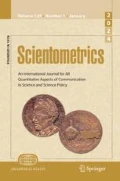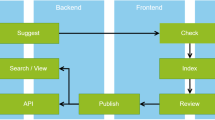Abstract
The paper provides an introduction to the recently completed project to derive a Research Core Dataset (RCD) for the German science system. In addition to explaining the rationale and background of the standardization project, it describes the workflow of the RCD project by focusing on the challenges, approaches and processes as well as the guiding principles. In this context, the paper also explains the peculiarities of the German science system and compares the project to other international standardization endeavours. The paper concludes with a short outlook on the potential chances and risks of the project.

Similar content being viewed by others
References
Baker, D. (2012). CASRAI and research impacts. In S. Bittner, S. Hornbostel, F. Scholze (Eds.), Forschungsinformation in Deutschland: Anforderungen, Stand und Nutzen existierender Forschungsinformationssysteme—Workshop Forschungsinformationssysteme 2011 (pp. 127–137). iFQ-Working Paper, No. 10.
Biesenbender, S., & Hornbostel, S. (2015). The Research Core Dataset for the German science system: Developing standards for integrated management of research information. Paper presented at the special session on “New frontiers and empirical evidence on the Efficiency, Effectiveness and Impact of Education, Research and Innovation” organized by C. Daraio at the 15th International Conference on Scientometrics and Informetrics (ISSI 2015), Boğaziçi University, Istanbul, Turkey.
Corson-Rikert, J., Krafft, D. B., & Lowe, B. J. (2012). VIVO: A semantic network of researchers and research information as linked open data. In S. Bittner, S. Hornbostel, F. Scholze (Eds.). Forschungsinformation in Deutschland: Anforderungen, Stand und Nutzen existierender Forschungsinformationssysteme—Workshop Forschungsinformationssysteme 2011 (pp. 139–154). iFQ-Working Paper, No. 10.
Dijk, E., Hogenaar, A., & van Meel, M. (2006). NARCIS—Integrating CRIS, OAI and Web Crawling. Paper presented at the 8th International Conference on Current Research Information Systems (CRIS2006), Bergen, Norway. http://hdl.handle.net/11366/328.
DINI AG Research Information Systems. (2015). Research information systems at universities and research institutions—Position paper. doi:10.5281/zenodo.17491.
German Council of Science and Humanities. (2013). Empfehlungen zu einem Kerndatensatz Forschung (Drs. 2855-13), Berlin, Germany. http://www.wissenschaftsrat.de/download/archiv/2855-13.pdf.
Glänzel, W., Beck, R., Milzow, K., Slipersæter, S., Toth, G., Kołodziejski, M., et al. (2015). Data collection and use in research funding and performing organisations: General outlines and first results of a project launched by science Europe. Paper presented at the panel on “Towards Standardisation, Harmonisation and Integration of Data from Heterogeneous Sources for Funding and Evaluation Purposes” organized by W. Glänzel at the 20th International Conference on Science and Technology Indicators (STI 2015), Università della Svizzera italiana, Lugano, Switzerland.
Johansson, Å, & Ottosson, M. O. (2012). A national current research information system for Sweden. Paper presented at the 11th International Conference on Current Research Information Systems (CRIS2012), Prague, Czech Republic. http://hdl.handle.net/11366/103.
Jörg, B. (2012). Übersicht Systeme in Europa. In S. Bittner, S. Hornbostel, & F. Scholze (Eds.), Forschungsinformation in Deutschland: Anforderungen, Stand und Nutzen existierender Forschungsinformationssysteme—Workshop Forschungsinformationssysteme 2011 (pp. 103–114). iFQ-Working Paper, No. 10.
OECD. (2002). Proposed standard practice for surveys of research and experimental development—Frascati manual. Paris: OECD. doi:10.1787/9789264199040-en.
Project group “Subject classification”. (2015). Interdisziplinarität im Forschungsberichtswesen: Empfehlungen zur Abbildung. http://www.kerndatensatz-forschung.de/version1/PGK_Empfehlungen_zur_Abbildung_von_Interdisziplinaritaet.pdf.
Riese, K. (2007). Kriterien zur Ressourcensteuerung an Hochschulen. Wiesbaden: Deutscher Universitäts-Verlag.
Sticht, K. (2015). Einsatz von Forschungsinformationssystemen an Universitäten und Hochschulen mit Promotionsrecht in Deutschland—Ergebnisbericht. doi:10.5281/zenodo.13841.
Wenaas, L., Karlstrøm, N., & Vatnan, T. (2012). From a national CRIS along the road to Green Open Access—And back again: Building infrastructure from CRIStin to Institutional Repositories in Norway. Paper presented at the 11th International Conference on Current Research Information Systems (CRIS2012), Prague, Czech Republic. http://hdl.handle.net/11366/116.
Wilsdon, J., et al. (2015). The metric tide: Report of the Independent review of the role of metrics in research assessment and management. doi:10.13140/RG.2.1.4929.1363.
Author information
Authors and Affiliations
Corresponding author
Rights and permissions
About this article
Cite this article
Biesenbender, S., Hornbostel, S. The Research Core Dataset for the German science system: challenges, processes and principles of a contested standardization project. Scientometrics 106, 837–847 (2016). https://doi.org/10.1007/s11192-015-1816-y
Received:
Published:
Issue Date:
DOI: https://doi.org/10.1007/s11192-015-1816-y




